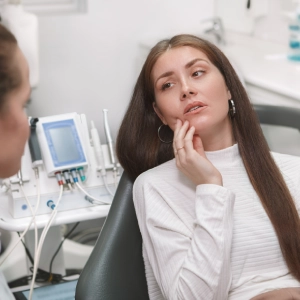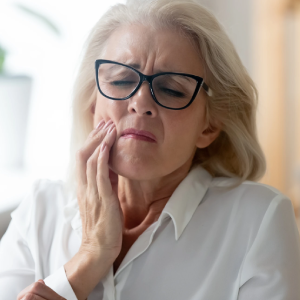Are you curious about "What are common causes of dental emergencies?" Dental emergencies can happen suddenly, leaving individuals in distress. Understanding the common triggers behind these emergencies is crucial for maintaining optimal oral health and knowing how to respond effectively in urgent situations.
This guide explores the various factors that can lead to dental emergencies, empowering you to identify the risks and take responsible measures to ensure your dental well-being.
Common Causes of Dental Emergencies
Some common causes of dental emergencies are discussed below-
Tooth Trauma:
Accidents or injuries to the mouth frequently lead to dental emergencies. Falls, sports mishaps, or car accidents can cause teeth fractures, chips, or even complete dislodgement. It's vital to seek prompt dental care to assess the damage and avoid possible complications.
Severe Toothache:
Dental issues such as decay, infection, or abscess commonly manifest as persistent and intense tooth pain. Ignoring severe toothaches can exacerbate pain, facilitate the spread of infection, and may even lead to tooth loss. Immediate treatment is necessary to alleviate discomfort and address the root cause of the problem.
Broken or Lost Fillings/Crowns:
Fillings or crowns that become damaged, loose, or dislodged can expose sensitive tooth structures to bacteria and debris, increasing the risk of decay and discomfort. Emergency dental care is essential to repair or replace the filling or crown and safeguard the affected tooth from further harm.
Abscess or Infection:
Dental abscesses, characterized by swelling, pus formation, and severe pain, indicate a bacterial infection in the gums or teeth. Without prompt treatment, abscesses can lead to systemic infections, bone loss, and even life-threatening complications. Dentists must intervene immediately to drain the abscess, eliminate infection, and prevent further spread.
Loose or Knocked-Out Tooth:
Teeth that are loose or completely knocked out due to trauma require immediate attention to increase the chances of successful reattachment or preservation. Quick action from dentists can help maintain the tooth's integrity, prevent permanent tooth loss, and restore oral function.
Objects Caught Between Teeth:
Food particles, foreign objects, or dental appliances lodged between teeth can cause discomfort, pain, and irritation of the surrounding tissues. Trying to remove objects with sharp or abrasive tools can lead to further damage. Emergency dental care is necessary for dentists to safely remove the object and address any resulting damage or discomfort.
Orthodontic Emergencies:
Issues with orthodontic appliances like braces or wires can lead to irritation, cuts, or injuries to the mouth's soft tissues. Loose brackets, broken wires, or displaced appliances demand immediate attention from a dentist or orthodontist to prevent discomfort, injury, or treatment delays.
Sudden Jaw Pain:
Unexplained or severe jaw pain may signal temporomandibular joint (TMJ) disorders characterized by dysfunction or inflammation of the jaw joint. TMJ disorders can cause pain, stiffness, clicking or popping sounds, and difficulty chewing or speaking. Quick diagnosis and treatment by a dental professional are necessary to alleviate pain and restore jaw function.
These examples show why it's important to deal with dental problems right away. Getting help fast can stop things from worsening, ease pain, and keep your mouth healthy. Going to the dentist as soon as possible means they can help you with your specific dental problem.
Essential Tips to Prevent Dental Emergencies
- Keep Your Mouth Clean: Brush your teeth twice a day using fluoride toothpaste and floss every day to get rid of plaque, prevent tooth decay, and avoid gum disease.
- Wear Protective Gear: If you play sports or perform activities with a risk of dental injury, wear mouthguards or helmets to protect your teeth and jaw.
- Avoid Chewing Hard Objects: Refrain from chewing on hard objects like ice, pens, or popcorn kernels, as they can crack or damage your teeth.
- Schedule Regular Dental Check-ups: Visit your dentist for routine check-ups and cleanings to identify potential issues early and prevent emergencies.
- Watch Your Diet: Cut back on the amount of acidic and sugary meals and beverages that might cause tooth erosion and decay. Opt for more nutritious options like fruits, veggies, and dairy.
Conclusion
Understanding why dental emergencies happen is important for keeping your mouth healthy. "What are Common Causes of Dental Emergencies?" helps you learn about possible risks and situations that can lead to dental emergencies. This information empowers you to take steps to protect your dental health. By recognizing signs of dental emergencies and getting help from a dentist quickly, you can reduce risks, feel better, and keep your mouth healthy.
For Arlington, VA, residents seeking top-notch dental care, Arlington Dental Excellence is your go-to choice. Schedule an appointment today to experience personalized dental services tailored to your needs. For new patients, dial (703) 420-3253, while all other callers can reach us at (703) 525-0157.
FAQs
What should I do if I experience a dental emergency?
If you have a dental emergency, like a knocked-out tooth or severe tooth pain, get in touch with your dentist right away for guidance and treatment.
Are dental emergencies always painful?
Not all dental emergencies cause immediate pain. Some emergencies, like a cracked tooth or a lost filling, may not be initially painful but still require prompt attention from a dentist to prevent further complications.
Can poor oral hygiene lead to dental emergencies?
Yes, poor oral hygiene can increase the risk of dental emergencies. Neglecting proper oral care can result in tooth decay, gum disease, and other issues that may lead to emergencies like severe toothaches or abscesses.






